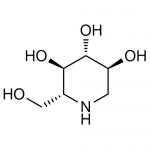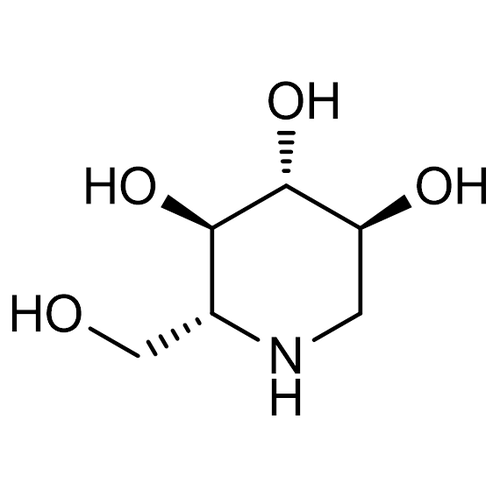| Product Name | 1-Deoxynojirimycin |
| Description |
Glycosidase inhibitor |
| Purity | >98% (TLC); NMR (Conforms) |
| CAS No. | 19130-96-2 |
| Molecular Formula | C6H13NO4 |
| Molecular Weight | 163.2 |
| Field of Use | Not for use in humans. Not for use in diagnostics or therapeutics. For in vitro research use only. |
Properties
| Storage Temperature | -20ºC |
| Shipping Temperature | Blue Ice or 4ºC |
| Product Type | Inhibitor |
| Solubility | May be dissolved in water (25 mg/ml) |
| Source | Synthetic |
| Appearance | White powder |
| SMILES | C1C(C(C(C(N1)CO)O)O)O |
| InChI | InChI=1S/C6H13NO4/c8-2-3-5(10)6(11)4(9)1-7-3/h3-11H,1-2H2/t3-,4+,5-,6-/m1/s1 |
| InChIKey | LXBIFEVIBLOUGU-JGWLITMVSA-N |
| Safety Phrases |
WHMIS Classification: Not Rated. Not a hazardous substance or mixture. HMIS Classification: Health hazard: 0 Flammability: 0 Physical hazards: 0 Potential Health Effects: Inhalation - May be harmful if inhaled. May cause respiratory tract irritation. Skin - May be harmful if absorbed through skin. May cause skin irritation. Eyes - May cause eye irritation. Ingestion - May be harmful if swallowed. |
| Cite This Product | 1-Deoxynojirimycin (StressMarq Biosciences Inc., Victoria BC CANADA, Catalog # SIH-547) |
Biological Description
| Alternative Names | 1-deoxymannojirimycin, 1-DEOXYNOJIRIMYCIN, 19130-96-2, DUVOGLUSTAT, (2R,3R,4R,5S)-2-(hydroxymethyl)piperidine-3,4,5-triol, Moranoline, Deoxynojirimycin |
| Research Areas | Immunology |
| PubChem ID | 29435 |
| Scientific Background | 1-Deoxynojirimycin (DNJ) is a naturally occurring iminosugar best known for its potent inhibition of α-glucosidases, enzymes critical to glycoprotein processing and carbohydrate metabolism. While DNJ has been extensively studied in the context of metabolic disorders such as diabetes and lysosomal storage diseases, its relevance to neuroscience is gaining attention. In neurodegenerative disease research, DNJ’s ability to modulate glycosphingolipid metabolism positions it as a promising candidate for targeting pathological protein aggregation and lysosomal dysfunction—hallmarks of disorders like Parkinson’s and Gaucher disease. Recent studies suggest that DNJ and its derivatives may influence neuroinflammatory pathways and neuronal survival by altering glycan processing, potentially mitigating neurodegeneration. Its role in modulating endoplasmic reticulum stress and autophagy further underscores its therapeutic potential in neurodegenerative contexts. Additionally, DNJ’s capacity to cross the blood-brain barrier enhances its appeal for central nervous system applications. Beyond neuroscience, DNJ remains a cornerstone compound in glycobiology and antiviral research, particularly for its ability to interfere with viral glycoprotein maturation. |



Reviews
There are no reviews yet.